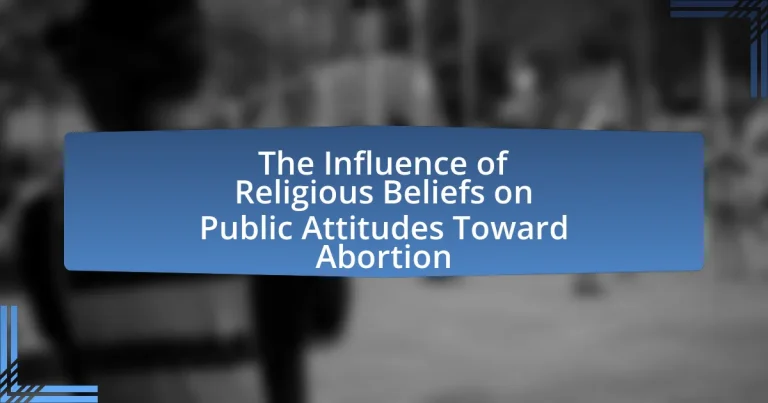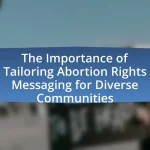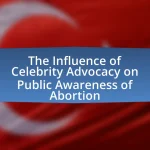The article examines the influence of religious beliefs on public attitudes toward abortion, highlighting how these beliefs shape moral perspectives and societal norms. It discusses the contrasting views of conservative religious groups, such as evangelical Christians and Catholics, who typically oppose abortion, versus more liberal religious and secular perspectives that support reproductive rights. Key findings from research, including data from the Pew Research Center, illustrate the correlation between religious affiliation and attitudes toward abortion, emphasizing the role of religious institutions and leaders in shaping public opinion and influencing legislation. The article also explores the psychological effects of religious beliefs on individuals’ decision-making regarding abortion and the importance of community support in shaping these attitudes.
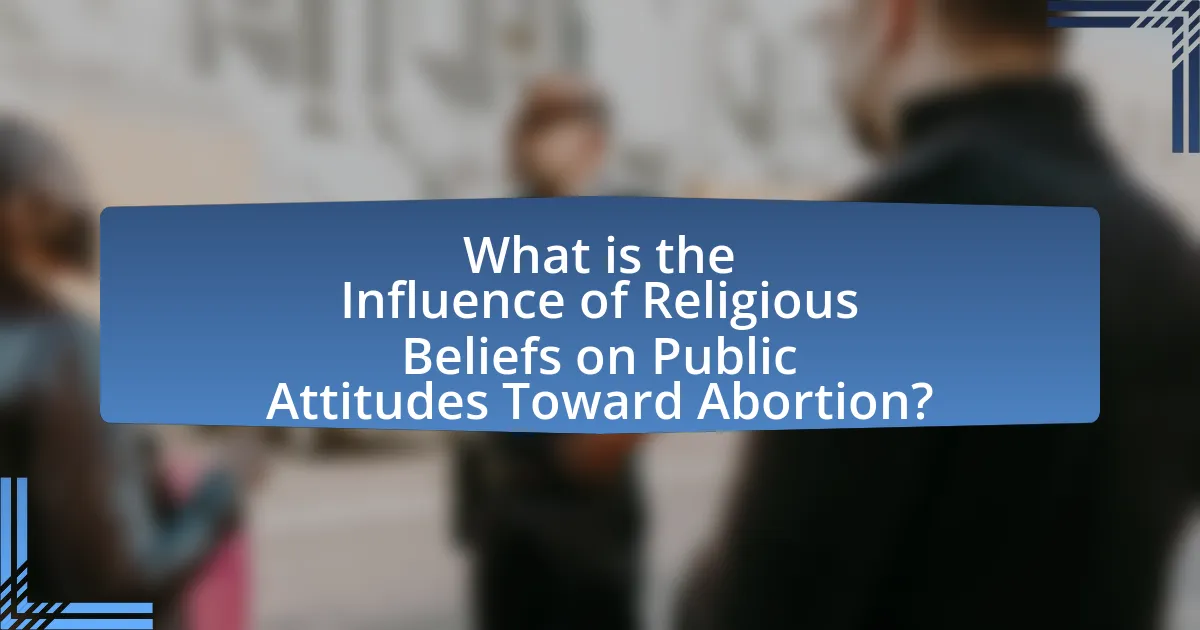
What is the Influence of Religious Beliefs on Public Attitudes Toward Abortion?
Religious beliefs significantly influence public attitudes toward abortion, often shaping individuals’ moral perspectives and societal norms. For instance, individuals who identify with conservative religious traditions, such as evangelical Christianity or Catholicism, typically oppose abortion, viewing it as morally unacceptable based on their religious teachings. In contrast, those from more liberal religious backgrounds or secular viewpoints may support abortion rights, emphasizing personal autonomy and reproductive choice. Research conducted by the Pew Research Center indicates that 61% of white evangelical Protestants believe abortion should be illegal in most cases, while only 29% of religiously unaffiliated individuals share that view. This data illustrates how religious affiliation directly correlates with attitudes toward abortion, highlighting the profound impact of religious beliefs on public opinion in this area.
How do religious beliefs shape individual perspectives on abortion?
Religious beliefs significantly shape individual perspectives on abortion by providing moral frameworks that influence views on the sanctity of life. For instance, many adherents of Christianity, particularly within Catholicism, believe that life begins at conception, leading to a strong opposition to abortion based on the belief that terminating a pregnancy is equivalent to taking a life. Similarly, Islamic teachings emphasize the value of life, with many Muslims viewing abortion as permissible only under specific circumstances, such as to save the mother’s life. Research indicates that individuals who actively engage with their religious communities often hold more conservative views on abortion, as seen in studies conducted by the Pew Research Center, which found that 61% of white evangelical Protestants oppose abortion in all or most cases. This correlation between religious adherence and anti-abortion sentiment underscores how deeply ingrained beliefs can dictate personal and societal attitudes toward the issue.
What specific religious doctrines influence views on abortion?
Specific religious doctrines that influence views on abortion include the Catholic Church’s teaching on the sanctity of life, which asserts that life begins at conception and abortion is morally unacceptable. Similarly, many evangelical Protestant denominations hold a belief in the inherent value of life from the moment of conception, leading to opposition against abortion. In contrast, some liberal religious groups, such as certain branches of Judaism, may support a woman’s right to choose based on the principle of preserving her health and well-being. These doctrinal positions shape the beliefs and attitudes of their adherents regarding abortion, impacting public discourse and policy.
How do personal interpretations of faith affect attitudes toward abortion?
Personal interpretations of faith significantly shape attitudes toward abortion, as individuals often align their beliefs with their religious teachings. For instance, many adherents of conservative religious traditions view abortion as morally unacceptable based on doctrines that emphasize the sanctity of life. Research indicates that 61% of individuals who identify as evangelical Christians oppose abortion, reflecting their interpretation of faith that prioritizes fetal life. Conversely, those from more liberal religious backgrounds may interpret their faith as supporting reproductive rights, leading to more favorable attitudes toward abortion access. This divergence illustrates how personal faith interpretations directly influence individual and collective stances on abortion, demonstrating the complex interplay between belief systems and moral decision-making.
What role do religious institutions play in shaping public opinion on abortion?
Religious institutions significantly influence public opinion on abortion by promoting specific moral and ethical perspectives that align with their doctrines. For instance, many religious groups, particularly within Christianity, advocate for pro-life stances, emphasizing the sanctity of life from conception. This advocacy shapes the beliefs and attitudes of their congregants, often leading to increased opposition to abortion in communities where these institutions are prominent. Research indicates that individuals who regularly attend religious services are more likely to identify as pro-life, with studies showing that 60% of weekly churchgoers oppose abortion compared to 30% of those who do not attend services. This correlation highlights the role of religious teachings in framing the discourse around abortion and influencing legislative outcomes.
How do religious leaders influence their congregations’ views on abortion?
Religious leaders influence their congregations’ views on abortion primarily through sermons, teachings, and community engagement. These leaders often interpret religious texts and doctrines to shape moral perspectives on abortion, framing it as a moral or ethical issue. For instance, many religious organizations, such as the Catholic Church, explicitly oppose abortion based on their interpretation of the sanctity of life, which is communicated through official teachings and pastoral guidance. Studies indicate that congregational beliefs about abortion are significantly aligned with the positions advocated by their religious leaders, as these leaders serve as key sources of moral authority and guidance within their communities.
What impact do religious organizations have on abortion legislation?
Religious organizations significantly influence abortion legislation by advocating for policies that align with their beliefs, often promoting pro-life stances. For instance, many religious groups mobilize their congregations to lobby lawmakers, resulting in the introduction and support of restrictive abortion laws in various states. Research indicates that states with higher levels of religious adherence tend to enact more stringent abortion regulations, as seen in the Guttmacher Institute’s findings, which show a correlation between religious conservatism and legislative outcomes. Additionally, religious organizations often provide funding and resources to political campaigns that oppose abortion, further shaping the legislative landscape.
Why is understanding the influence of religious beliefs on abortion important?
Understanding the influence of religious beliefs on abortion is important because these beliefs significantly shape public attitudes and policy decisions regarding the issue. Religious doctrines often dictate moral perspectives on abortion, leading to polarized views within society. For instance, studies show that individuals who identify with more conservative religious groups are more likely to oppose abortion, while those from more liberal or secular backgrounds tend to support reproductive rights. This dynamic affects legislative outcomes, as seen in various states where religious lobbying groups actively campaign against abortion access, influencing laws and regulations. Therefore, comprehending these influences is crucial for addressing the complexities of abortion discourse and formulating effective public health policies.
How can this understanding affect public policy and discourse?
Understanding the influence of religious beliefs on public attitudes toward abortion can significantly shape public policy and discourse by informing lawmakers and stakeholders about the values and concerns of their constituents. For instance, research indicates that individuals with strong religious convictions often oppose abortion, which can lead to the enactment of restrictive abortion laws in regions where such beliefs are prevalent. A study by the Pew Research Center found that 61% of white evangelical Protestants believe abortion should be illegal in most cases, highlighting how these beliefs can drive legislative agendas and influence public debates. Consequently, policymakers may prioritize laws that align with the moral perspectives of religious groups, affecting access to abortion services and shaping societal discourse around reproductive rights.
What implications does this have for social movements surrounding abortion?
The implications of religious beliefs on public attitudes toward abortion significantly shape social movements surrounding the issue. Religious groups often mobilize to advocate for or against abortion rights, influencing public policy and societal norms. For instance, a 2021 Pew Research Center study found that 61% of white evangelical Protestants oppose abortion in all or most cases, which drives anti-abortion activism and legislative efforts in various states. Conversely, religiously unaffiliated individuals tend to support abortion rights, leading to pro-choice movements that challenge restrictive laws. This dynamic creates a polarized environment where social movements must navigate the complexities of religious influence to effectively advocate for their positions on abortion.
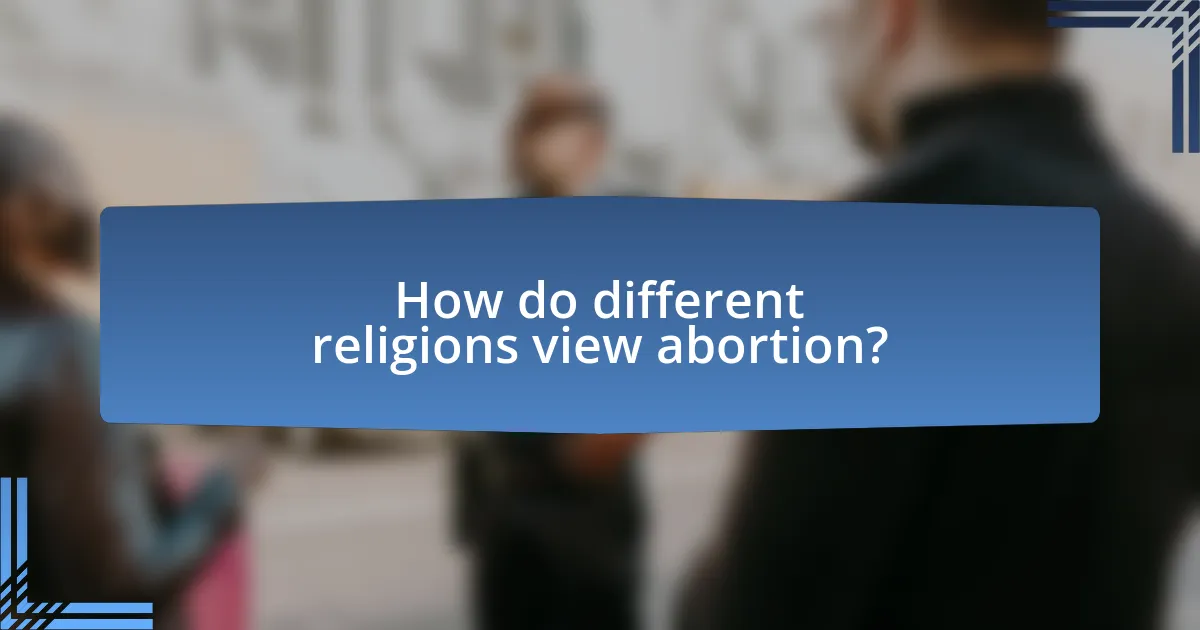
How do different religions view abortion?
Different religions have varied views on abortion, often influenced by their theological principles and ethical teachings. For instance, Christianity generally opposes abortion, viewing it as the taking of innocent life, with many denominations advocating for the sanctity of life from conception. In contrast, Judaism permits abortion under certain circumstances, particularly when the mother’s life or health is at risk, emphasizing the importance of preserving life. Islam also allows abortion, particularly within the first 120 days of pregnancy, if there are valid reasons, such as maternal health concerns. Buddhism typically advocates for non-harm, leading to a more nuanced view that can vary among different traditions, but often leans towards discouraging abortion. These perspectives reflect the broader influence of religious beliefs on public attitudes toward abortion, shaping moral and ethical discussions within societies.
What are the perspectives of major world religions on abortion?
Major world religions have diverse perspectives on abortion. In Christianity, particularly within the Catholic Church, abortion is viewed as morally wrong, equating it to the taking of a human life, based on teachings from the Bible and church doctrine. In Islam, the majority opinion allows abortion under certain circumstances, particularly if the mother’s life is at risk or in cases of severe fetal abnormalities, referencing interpretations of the Quran and Hadith. Judaism generally permits abortion, especially to protect the mother’s health, as derived from the Talmudic principle that the mother’s life takes precedence. Buddhism typically emphasizes compassion and the alleviation of suffering, leading to varied interpretations, but many Buddhists may lean towards allowing abortion in cases of significant hardship. Hinduism also presents a range of views, with some texts advocating for the sanctity of life while others recognize the complexities of individual circumstances, allowing for abortion in specific situations. These perspectives reflect the broader influence of religious beliefs on public attitudes toward abortion, shaping moral and ethical discussions globally.
How does Christianity’s view on abortion vary among denominations?
Christianity’s view on abortion varies significantly among denominations, with some opposing it entirely and others allowing for exceptions. The Roman Catholic Church firmly opposes abortion, teaching that life begins at conception and that terminating a pregnancy is morally unacceptable. In contrast, many mainline Protestant denominations, such as the United Methodist Church and the Episcopal Church, support a woman’s right to choose, emphasizing individual conscience and circumstances. Evangelical denominations often align with the Catholic stance, advocating for pro-life positions, while some liberal Christian groups may endorse abortion rights, focusing on social justice and women’s autonomy. This diversity reflects broader theological interpretations and cultural contexts within Christianity.
What is the stance of Islam on abortion, and how does it differ among sects?
Islam generally views abortion as impermissible, but there are nuances based on different sects and circumstances. Sunni Islam typically prohibits abortion after 120 days of gestation, aligning with the belief that the soul enters the fetus at that point. However, exceptions are made in cases of maternal health risks or severe fetal abnormalities. Shia Islam also prohibits abortion after 120 days but allows it earlier under similar circumstances, emphasizing the importance of the mother’s life and health. These differences reflect broader theological interpretations and cultural contexts within the Islamic community.
What are the cultural implications of religious views on abortion?
Religious views on abortion significantly shape cultural attitudes and societal norms regarding reproductive rights. For instance, in predominantly Catholic countries, such as Poland, strict anti-abortion laws reflect the Church’s teachings, leading to widespread public support for these restrictions. Conversely, in more secular societies, like those in Scandinavia, religious views tend to have less influence, resulting in more liberal abortion laws and greater acceptance of reproductive choices. This divergence illustrates how religious beliefs can create cultural divides, impacting legislation, healthcare access, and individual rights. The Pew Research Center found that 61% of Americans who attend religious services weekly oppose abortion, highlighting the correlation between religious observance and anti-abortion sentiment.
How do cultural contexts influence religious beliefs about abortion?
Cultural contexts significantly influence religious beliefs about abortion by shaping moral frameworks and interpretations of sacred texts. For instance, in predominantly Catholic countries like Poland, cultural values emphasize the sanctity of life, leading to stricter anti-abortion laws and strong opposition from religious institutions. Conversely, in more secular societies, such as those in Scandinavia, cultural acceptance of individual rights and gender equality fosters more liberal views on abortion, often supported by religious groups that prioritize compassion and personal choice. This divergence illustrates how cultural norms and societal values can dictate the religious stance on abortion, affecting both individual beliefs and institutional policies.
What role does tradition play in shaping these beliefs?
Tradition plays a crucial role in shaping beliefs about abortion, particularly within religious contexts. Religious traditions often provide a framework of moral values and ethical guidelines that influence followers’ views on abortion. For instance, many Christian denominations uphold the belief that life begins at conception, a view rooted in longstanding theological interpretations and scriptural references. This traditional stance shapes congregants’ attitudes, leading to widespread opposition to abortion within these communities. Additionally, sociological studies indicate that individuals raised in religious households are more likely to adopt conservative views on abortion, reinforcing the impact of tradition on belief formation.
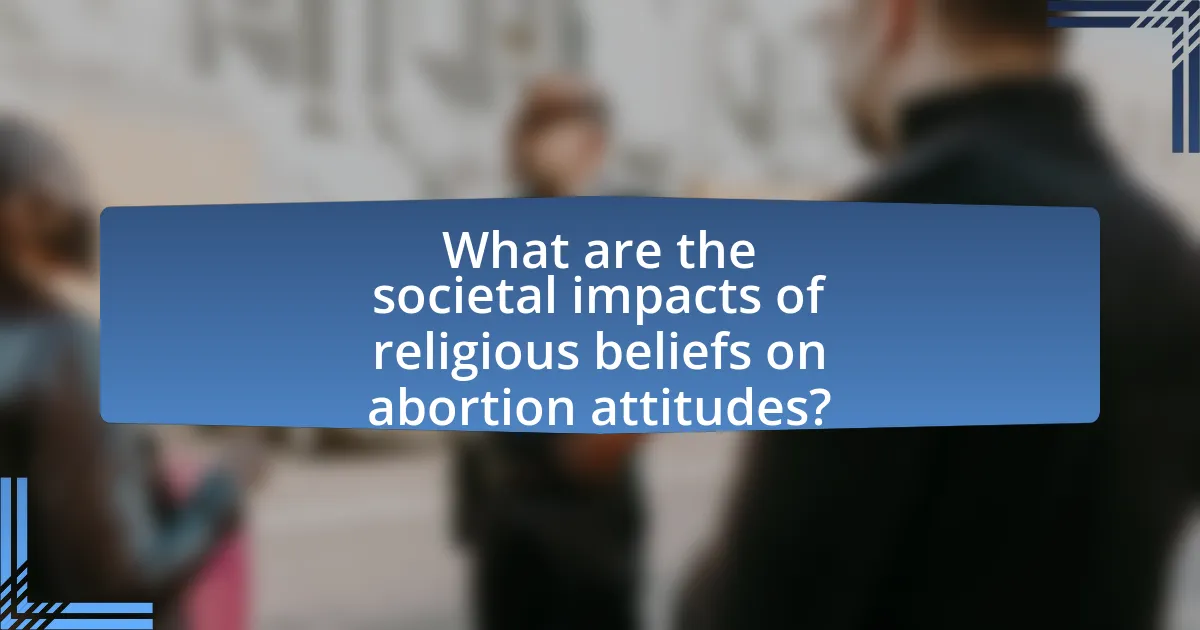
What are the societal impacts of religious beliefs on abortion attitudes?
Religious beliefs significantly shape societal attitudes toward abortion, often leading to polarized views. For instance, individuals from conservative religious backgrounds typically oppose abortion, viewing it as morally unacceptable based on doctrinal teachings. This opposition can manifest in public policy advocacy, influencing legislation that restricts access to abortion services. Research indicates that states with higher populations of religious conservatives tend to enact more restrictive abortion laws, reflecting the societal impact of these beliefs. A study by the Pew Research Center found that 61% of white evangelical Protestants believe abortion should be illegal in most cases, illustrating how religious convictions can drive collective attitudes and legislative outcomes regarding abortion.
How do religious beliefs affect public policy regarding abortion?
Religious beliefs significantly influence public policy regarding abortion by shaping the moral and ethical frameworks within which lawmakers operate. For instance, in the United States, predominantly Christian beliefs have led to the enactment of restrictive abortion laws in many states, reflecting the views of constituents who oppose abortion on religious grounds. Research from the Pew Research Center indicates that individuals who attend religious services regularly are more likely to oppose abortion, which in turn pressures politicians to align their policies with these beliefs to secure votes. Consequently, this alignment manifests in legislation that restricts access to abortion services, such as mandatory waiting periods and parental consent laws, demonstrating the direct impact of religious beliefs on public policy.
What examples exist of legislation influenced by religious groups?
Legislation influenced by religious groups includes the Hyde Amendment, which restricts federal funding for abortions, reflecting the views of many religious organizations that oppose abortion. Additionally, various states have enacted laws such as waiting periods and mandatory counseling requirements, often promoted by religious groups advocating for pro-life positions. For instance, in 2019, Alabama passed a near-total abortion ban, heavily supported by evangelical Christian groups, demonstrating the significant impact of religious beliefs on abortion-related legislation.
How do religious beliefs contribute to the polarization of abortion debates?
Religious beliefs significantly contribute to the polarization of abortion debates by shaping individuals’ moral frameworks and influencing their views on the sanctity of life. For instance, many religious groups, particularly within Christianity, advocate for the belief that life begins at conception, leading to a strong anti-abortion stance. This perspective is supported by various religious texts and teachings, which assert that terminating a pregnancy is equivalent to taking a life. Conversely, other religious traditions may emphasize women’s autonomy and the importance of personal choice, resulting in a pro-abortion rights position. The contrasting interpretations of religious doctrine create a divide among adherents, fueling intense debates and often leading to social and political conflict. Research indicates that individuals who identify strongly with their religious beliefs are more likely to hold polarized views on abortion, as evidenced by surveys showing that 70% of evangelical Christians oppose abortion compared to 50% of religiously unaffiliated individuals who support access to abortion services.
What are the psychological effects of religious beliefs on individuals’ views of abortion?
Religious beliefs significantly shape individuals’ views on abortion, often leading to strong moral convictions against the practice. For instance, many adherents of major religions, such as Christianity and Islam, perceive abortion as morally wrong based on doctrinal teachings that emphasize the sanctity of life. This belief can result in psychological effects such as guilt, anxiety, or internal conflict when faced with the topic of abortion, particularly if personal circumstances challenge their religious teachings. Research indicates that individuals with strong religious convictions are more likely to experience heightened emotional responses and social stigma related to abortion, reinforcing their opposition and affecting their mental well-being.
How do guilt and shame associated with religious beliefs impact decision-making about abortion?
Guilt and shame associated with religious beliefs significantly influence decision-making about abortion by creating emotional barriers and moral dilemmas for individuals. Many religious teachings frame abortion as morally wrong, leading individuals to experience guilt or shame when contemplating the procedure. This emotional turmoil can result in individuals feeling pressured to conform to religious norms, which may deter them from seeking an abortion even in circumstances where they might otherwise consider it. Research indicates that individuals with strong religious affiliations often report higher levels of guilt and shame regarding abortion, which can lead to increased psychological distress and conflict in their decision-making process. For example, a study published in the Journal of Religion and Health found that religious beliefs are strongly correlated with feelings of guilt and shame, which in turn affect reproductive choices.
What role does community support play in shaping attitudes toward abortion?
Community support significantly influences attitudes toward abortion by providing social validation and reinforcing shared beliefs. When individuals are surrounded by a community that openly discusses and supports specific views on abortion, they are more likely to adopt those perspectives. Research indicates that communities with strong religious affiliations often promote anti-abortion sentiments, which can lead to increased stigma against abortion and discourage individuals from seeking or discussing it. Conversely, communities that advocate for reproductive rights can foster a more accepting environment, encouraging open dialogue and support for those considering abortion. This dynamic illustrates how community norms and values directly shape individual attitudes and behaviors regarding abortion.
What strategies can be employed to foster dialogue on abortion across religious lines?
To foster dialogue on abortion across religious lines, strategies such as interfaith discussions, educational workshops, and collaborative community projects can be employed. Interfaith discussions create a platform for individuals from different religious backgrounds to share their perspectives and experiences, promoting understanding and empathy. Educational workshops can provide factual information about abortion, addressing misconceptions and highlighting the diverse religious teachings on the subject. Collaborative community projects, such as joint service initiatives, can help build relationships and trust among different religious groups, facilitating open conversations about sensitive topics like abortion. These strategies are effective as they encourage respectful dialogue and promote a shared understanding of differing beliefs, ultimately contributing to a more informed and compassionate discourse on abortion.
